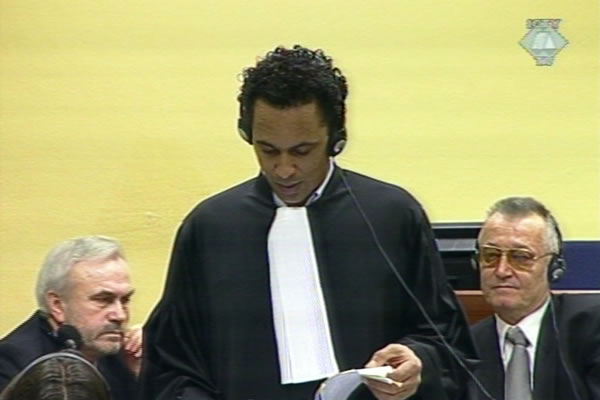Home
DEFENSE: ‘JOVICA STANISIC SHOULD BE ALLOWED TO ENJOY THE PEACE HE HAD BROUGHT ABOUT’
The defense of the former DB chief Jovica Stanisic considers that the prosecution’s demand that their client be sentenced to life is ‘a grave act’, unsupported by arguments. The defense calls for Stanisic’s release, as the evidence has shown he is a man who did not pursue Belgrade’s war policy but led peace initiatives
 Wayne Jordash, branilac Jovice Stanišića
Wayne Jordash, branilac Jovice Stanišića In the very first sentence of his closing argument, defense counsel Wayne Jordash said Jovica Stanisic should leave the courtroom ‘as a free man without any stains on his reputation’. He believes that the responsibility of the former chief of the Serbian State Security Service (DB) for the crimes in Croatia and BH was not proven and that he should be allowed to go back home ‘and enjoy the peace he helped bring about’.
Jordash referred to the prosecution’s demand that Jovica Stanisic and his right hand man in the Serbian secret service, Franko Simatovic be sentenced to life in prison for their part in the joint criminal enterprise whose goal was to ethnically cleanse large areas in Croatia and BH through crimes committed by the units under their control. The defense considers that a demand for the sentence of life imprisonment is ‘a grave act’. If such a demand is not supported by valid evidence, as is the case with Stanisic, it will ‘not contribute to the Tribunal’s reputation’. The evidence of the contribution by the former Serbian DB chief is, in Jordash’s view, ‘too unreliable and too scanty when it comes to key issues’.
By nature of his function, Stanisic had to be close to the people identified as the participants in the joint criminal enterprise, from the Serbian president Milosevic to the RSK officials Martic and Babic, and political and military leaders of the Bosnian Serbs, Karadzic and Mladic, Jordash argued. But mere closeness with those people was not enough to prove responsibility for crimes, the defense stated in the closing argument. Jordash believes Stanisic met with various high-ranking officials in order to obtain ‘the best intelligence’ he needed in order to perform his legitimate job, protecting the security of the Republic of Serbia.
The defense challenged the prosecution’s argument that Stanisic was Slobodan Milosevic’s contact with the Serb leaders in Krajina and Bosnia in the effort to implement the goal of expelling the Croats and Muslims from the territories that the Serbs claimed as theirs. Defense counsel Jordash claims that Stanisic was in fact Milosevic’s envoy, and that he tried to ‘calm down’ the extremists in Krajina and Republika Srpska, to get them to accept the peace plans. Stanisic was a ‘calm diplomat who ‘kept his head in the madness of war’ and who spearheaded the initiatives that finally led to peace, Jordash said.
The prosecution alleges that the two accused established trained, financed, supplied and controlled the units that committed the crimes in Croatia and BH, such as the Red Berets, Arkan’s men or the Scorpions; according to the defense, there is no evidence to link Stanisic with them at all. As the defense argued, the prosecution failed to provide evidence of Stanisic’s involvement in the effort to support those units. The prosecution therefore opted to argue that his activities were ‘secret’. The prosecution thus painted a picture of DB’s operations that was ‘straight out of Hollywood’, comparing the DB with ‘the illegal actions by the CIA and MI6 in the aftermath of the 9/11 attacks’.
In the last session,, the defense of the second accused Franko Simatovic started their closing argument. His defense counsel likewise claimed the prosecution had failed to prove anything, least of all Simatovic’s responsibility for the crimes he is charged with.
Linked Reports
- Case : Stanisic & Simatovic
- 2013-01-29 PROSECUTION SEEKS LIFE SENTENCE FOR STANISIC AND SIMATOVIC
- 2012-11-09 CLOSING ARGUMENTS IN STANISIC AND SIMATOVIC CASE NO NEARER
- 2012-11-02 LAST EXHIBITS IN SIMATOVIC AND STANISIC CASE
- 2013-01-31 DEFENCE CALLS FOR SIMATOVIC’S ACQUITTAL
- 2013-05-30 JOVICA STANISIC AND FRANKO SIMATOVIC ACQUITTED
- 2013-06-03 STANISIC AND SIMATOVIC JUDGMENT IN ‘DARK AREA’ OF INTERNATIONAL LAW
